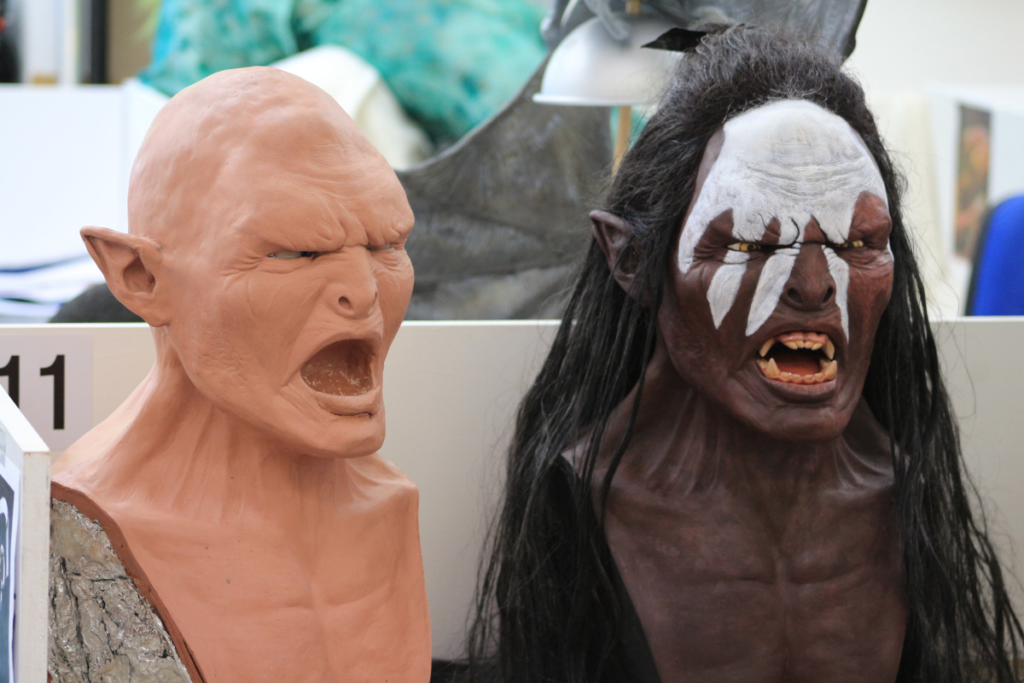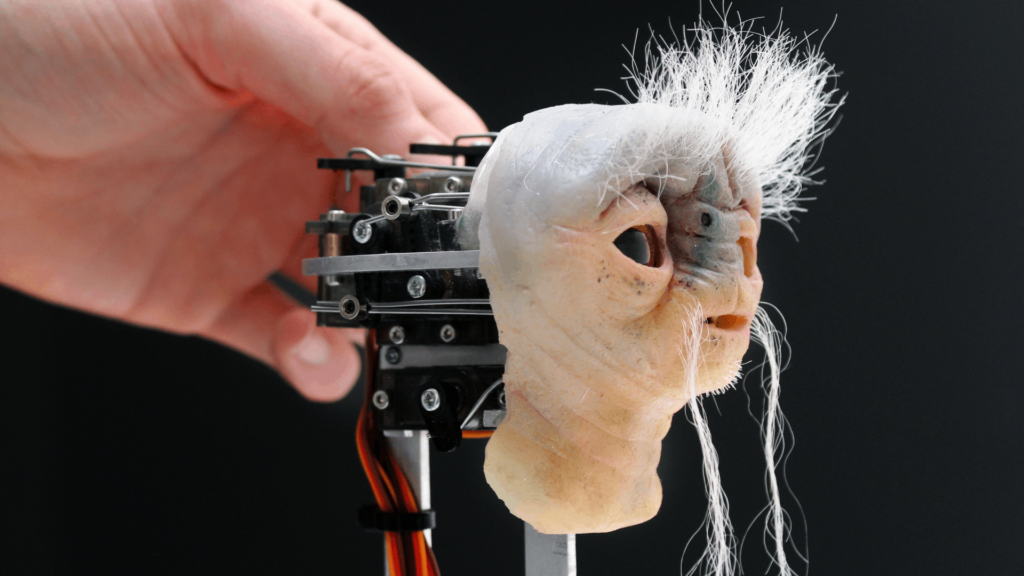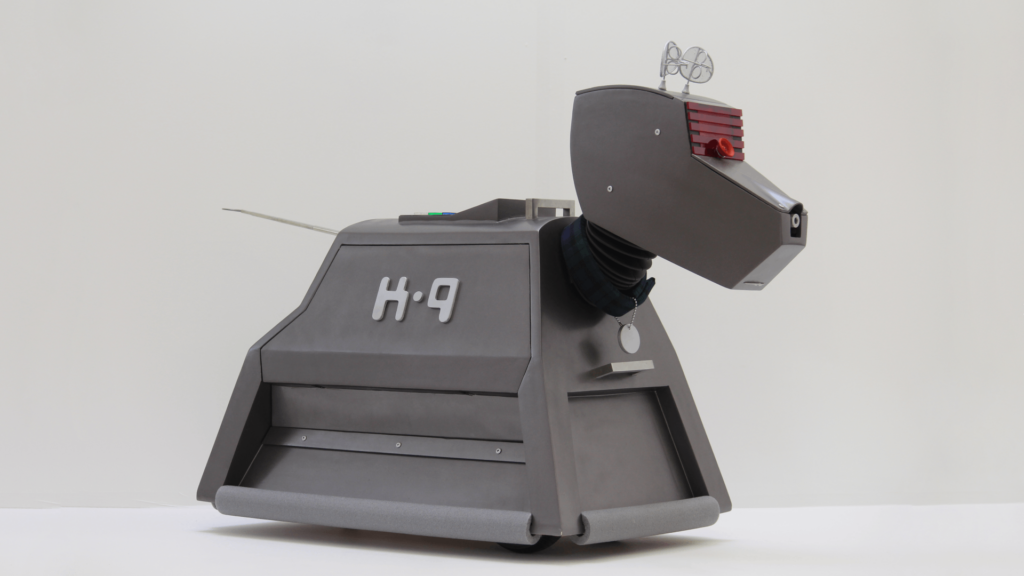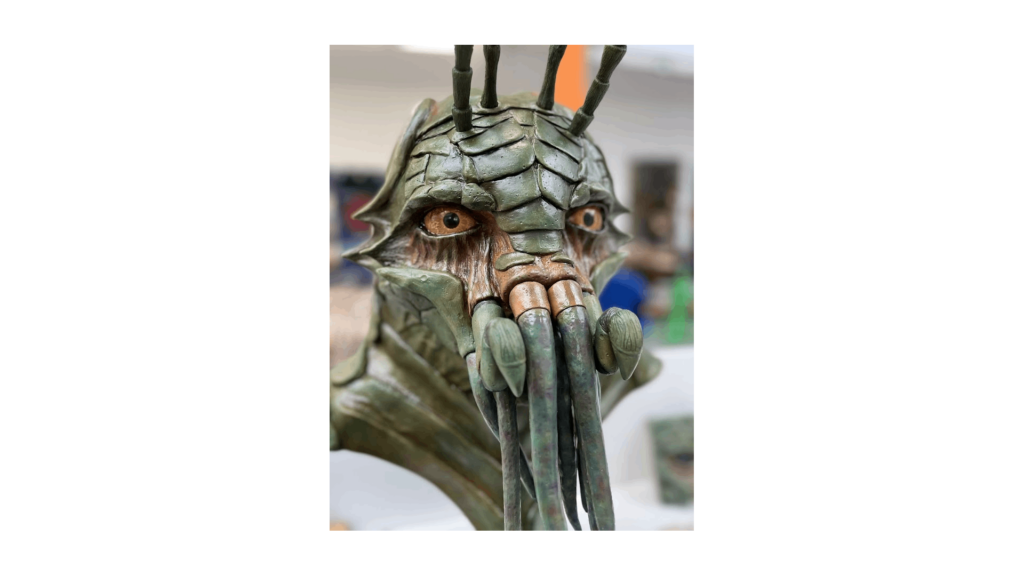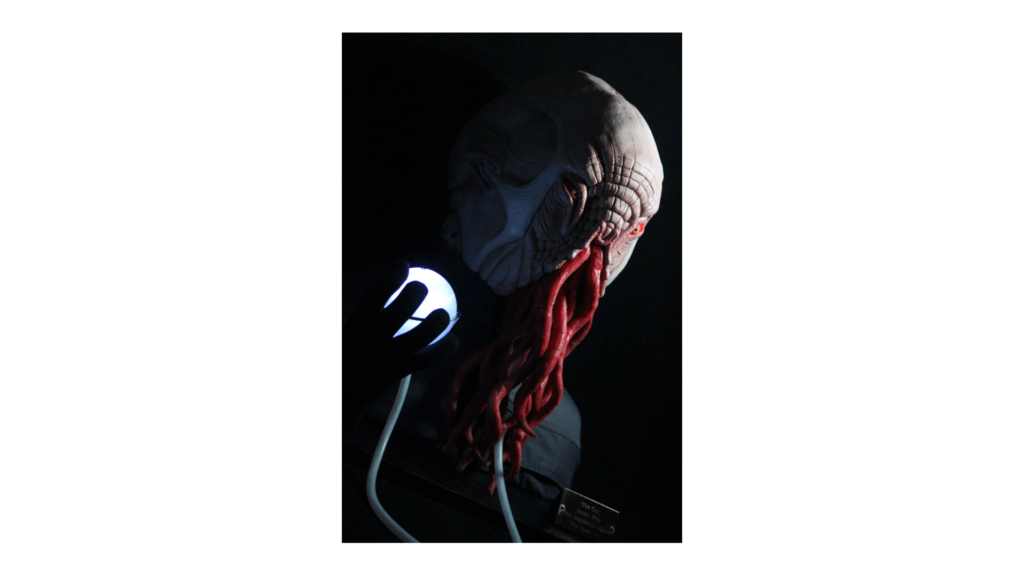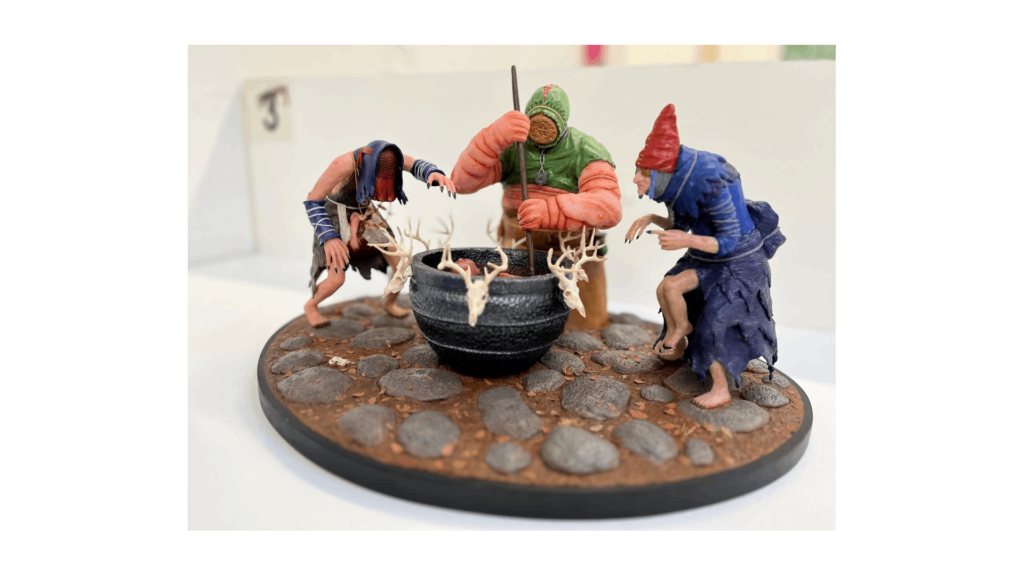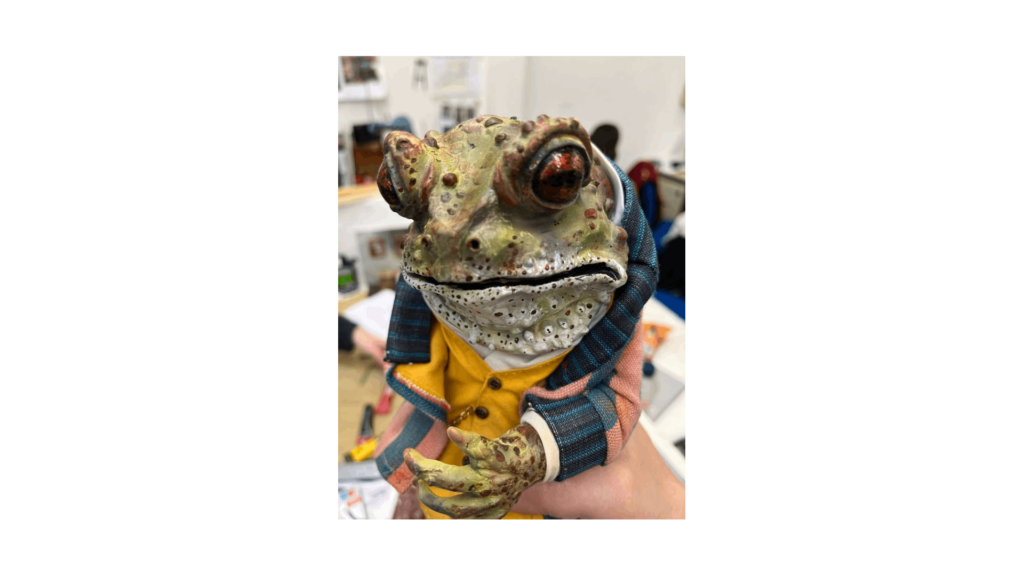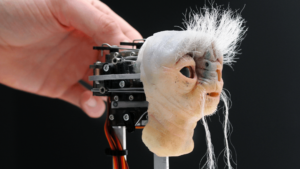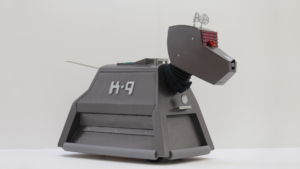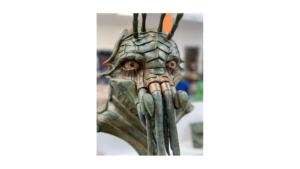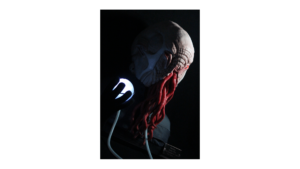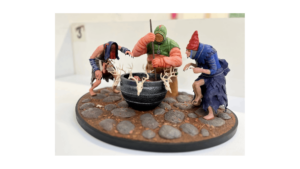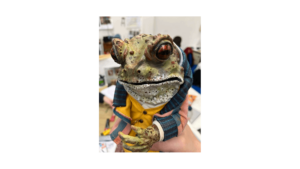With pathways in Stage Management, Production Management, Lighting Design and Sound Design, this course offers practical and vocational training in our professionally equipped theatre and studio space.

COURSE OVERVIEW
Institution Code: C57
UCAS Course code: W490
This dynamic and creative course is designed to immerse you in the exciting world of prop design and manufacturing for theatre, TV, film, display and entertainment industries. Whether you come from a creative or academic background, this course unites all students with a shared passion for design and making, giving you the opportunity to turn your ideas into tangible works of art.
You will master a diverse array of techniques, from wood and metalwork, sculpting, and moulding and casting, to decorative finishes, model making, and soft props/puppetry. You’ll also have the chance to explore cutting-edge technologies such as CAD, laser cutting and 3D printing, giving you the skills needed to tackle the most innovative design challenges in the industry.
The curriculum covers a wide range of techniques, such as sculpting, model making, CAD, foam crafting, puppetry, mechanical systems, and decorative finishes. Students work on live projects for real clients, gaining hands-on experience in creating high-quality props for productions, exhibitions, and corporate events. Sustainability is also a key focus, encouraging students to adopt eco-friendly approaches in their work.
A strong emphasis is placed on professional development, with industry placements, portfolio building and career support to ensure graduates are ready to enter the industry. Students have secured work with leading studios, theatres and production companies, including the National Theatre, Royal Shakespeare Company, Elstree Film Studios, English National Ballet and Universal Creations.
Graduates have gone on to work on high-profile films, TV series, advertisements, West End shows and magazine shoots, taking their talents to the biggest stages and screens.
Key features;
- Industry-focused, hands-on training
- Personal studio spaces to enhance creativity
- Professional wood and metal workshop facilities
- Dedicated resin and plaster rooms for sculpting and casting
- Fully equipped CAD suite for digital design
- Access to machine tools, plaster room, laser cutting and 3D printing
- Opportunity to work on professional projects with external clients
- Collaborate on real-life briefs
- Build a professional network through excellent industry connections
- High-profile industry links include: The National Theatre, Elstree Film Studios, Universal Creations, English National Ballet, Bower Wood, The Royal Shakespeare Company
Join us and unlock your potential in the world of prop design!
Module Overview:
This course is designed to provide you with a comprehensive understanding of both the practical and creative aspects of the prop making and special effects industry. The modules on this course equip students with the skills needed to design and manufacture props for film, TV, theatre and the entertainment industry.
Level 4 (Year One)
- Introduction and inductions (20 credits)
- Ideas in Context: Performance and Everyday life (20 credits)
- Sculpture (20 Credits)
- Prop Design (20 Credits)
- Collaboration (20 Credits)
- Model Making (20 Credits)
Level 5 (Year Two)
- Soft props and mechanics (20 Credits)
- Sustainable Practices (20 Credits)
- Project Management (40 Credits)
- Ideas in Context: Theatre and Performance Ideologies (20 Credits)
- Industry Awareness (20 Credits)
Level 6 (Year Three)
- Independent make (40 Credits)
- Professional practice (20 Credits)
- Dissertation (20 Credits)
- Locating Opportunities (40 Credits)
Collaboration is at the heart of what we do. You’ll work closely with other departments, such as set design, acting, photography and musical theatre, to bring your imagination to life. You’ll also have the chance to participate in real-world projects, from performances in our fully equipped theatre to external commissions, giving you practical experience and industry insight.
FURTHER INFORMATION
Ready to stand out and secure your place on our course? Here’s how we evaluate your application:
We look at each application individually, considering your grades, interview performance, portfolio or audition, and any relevant experience. While we typically expect the following qualifications:
- A relevant A-Level qualification, or
- A Level 3 Extended Diploma
We understand that not everyone follows the same path. If you don’t meet the standard entry requirements, don’t worry – there are still plenty of ways to show us what you’re capable of! Show us your potential through:
- Relevant academic or work experience
- A strong, compelling personal statement
- An exceptional portfolio and interview
What do I need to do to prepare for my audition/interview?
Interview:
Our interviews are an informal discussion with a staff member to review your portfolio, explore your passion for design and making, and your the facilities. You’ll also have the chance to meet current students and see their latest work.
If you’re unable to attend in person, we offer online interviews. However, we encourage you to join one of our visit days for a full tour. For more details, contact our admissions team or visit our course website: https://propsuk.com
Portfolio Requirements
Your portfolio should showcase a variety of skills and creative strengths. We don’t expect expertise in every area but aim to see a broad representations of your abilities in design, artistry, and practical making. Be prepared to discuss your work and ask any questions during the interview.
Recommended portfolio content:
- Sketchbooks & visual thinking – Demonstrating creativity and imaginations
- Life drawing & mark-making – Showing expressive and observational skills
- Painting & illustration – Highlighting use of different colour mediums
- Technical & digital drawings – Showcasing precision and visual communication
- Photographs of 3D work – Including sculptures in clay, wood, metal, foam or plastic
- Models, puppets & props – From coursework or personal projects
- Hobby-related work – Such as cosplay, LARP, wargaming or prop-making
Presenting a diverse range of skills will strengthen your application and demonstrate your potential as a designer and maker.
You’ll have the opportunity to progress into a variety of different careers, including:
- Prop Maker
- Model Maker
- Art Department Assistant
- Set Builder
- Production Assistant
Alumni Success
Graduates from this course have worked on major films, TV series, and theatre productions. Alumni have contributed to blockbuster films like Star Wars: The Last Jedi, Justice League and Transformers 5. Others have built careers in theatre and TV, working on productions such as Starlight Express, Cats, Les Misérables, Miss Saigon and Red Dwarf.
Some graduates have also shared their expertise at industry events and conventions, giving talks on prop making, costuming and set design.
Our teaching and assessment methods are designed to keep learning dynamic, engaging, and hands-on. You’ll experience a mix of:
- Practical and studio-based workshops to refine your skills
- Group discussions to exchange ideas and insights
- Critiques to help improve your work
- Lectures and seminars to explore concepts and techniques
- One-one-one tutorials for tailored feedback
- Group study and peer reviews to collaborate and learn from others
- Independent study to deepen your knowledge and creativity
Assessment methods are tailored to each unit and may include:
- Completing project work
- Delivering presentations
- Keeping journals of your creative journey
- Developing a research proposal
- Writing assignments to showcase your understanding
With this variety, you’ll have plenty of opportunities to grow and demonstrate your skills in ways that suit your strengths!
What are the costs of doing this course?
Tuition Fees:
The tuition fee for this course is £9,535 per year
Finance Options:
There are several options available to help you manage your tuition fees:
- Student Loan
- Instalment Payment Plan
- Company Sponsorship
For more information, please visit our Finance and Funding page – Funding your Course | Northbrook College
Additional Cost for Creative Degree courses:
When planning your studies, it is important to consider potential costs beyond tuition fees. While tuition fees cover teaching, assessment and access to college facilities, such as studios, shared IT resources and workshops, some courses may require additional expenses.
These could include:
- Textbooks: Essential texts and available in the college libraries, but you may wish to purchase personal copies for convenience.
- Computer Equipment: While on-campus computers are available, having a personal laptop or tablet may offer greater flexibility for off-site study.
- Printing and Photocopying. Most coursework is submitted online, but some assignments may require printed submissions, optional binding, or other presentation materials.
- Materials: Creative courses often require specific art materials or equipment. A detailed materials list will be provided upon enrolment.
- Field Trips: Certain courses may include optional study visits or field trips to enrich learning experiences.
- External Shows and Exhibitions: Opportunities to participate in external exhibitions or shows may involve additional preparation, materials or travel expenses.
We are committed to providing transparent information about any additional costs to help you plan effectively for your studies. For more information regarding financial support that we can offer, please visit our Financial support page – Financial Support | Northbrook College
Validated by University of the Arts London (UAL)
This course is validated by the University of the Arts London (UAL). UAL is a leading education provider in the creative arts, ranked second in the world for art and design (QS World University Rankings by Subject 2023). They oversee the standards and quality of our curriculum, which enriches your overall learning experience.
Please note this course is undergoing revalidation
Every 5 years UAL and Chichester College Group review course content to ensure that our students are benefiting from high-quality academic experience, During this process there may be some changes made to the course which are not immediately reflected in the content displayed on this page. The information on this page will be updated once the process has been completed. Please contact us if you have any questions about this or the course via enquiries-worthing@gbmc.ac.uk

